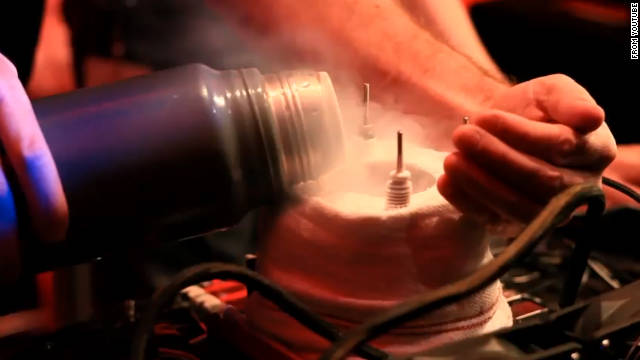'Bulldozer' chip sets world record -- with help of liquid Nitrogen
| |

(CNN) -- It's the fastest computer processor in the world -- but only if you have vats of liquid Nitrogen and Helium at the ready.
AMD, the computer-chip maker, announced on Tuesday that its processor called "Bulldozer" had broken the Guinness World Record for processing at a frequency of 8.429 gigahertz, which is about three times as fast as the processors you'd find in a speedy laptop.
The previous record, the company says, was 8.309 gigahertz.
Here's the catch: To ramp the chip up to that wild speed, testers had to pour liquid Nitrogen and liquid Helium on top of it, in a sort of mad-scientist experiment. Those chemicals, which hover at cold-miser temperatures between minus 180 and minus 230 degrees Celsius, let the chip go into overdrive mode without overheating and breaking.
So you could say the Bulldozer's real skill is not in being an awesome processor, but adequately withstanding cold temperatures.
AMD said as much in a blog post about the record:
"Based on our overclocking tests, the AMD FX CPU (Bulldozer) is a clock eating monster, temporarily able to withstand extreme conditions to achieve amazing speed," writes Simon Solotko, a senior manager at the company.
The post literally has a disclaimer at the bottom, warning everyday computer users like you and me not to try this at home:
"Overclocking and extreme cooling will void your hardware warranties and could cause serious damage to your PC hardware. We destroy motherboards, processors, and graphics cards at an alarming rate doing it. Liquid Helium and Liquid Nitrogen are incredibly dangerous in untrained hands and among some of the coldest substances in the universe.
"This record was achieved by some of the most experienced and methodical overclockers in the world and you should not attempt to recreate this experiment without major safety precautions and seriously thinking about the potential consequences of your actions."
Yes, "overclockers" is apparently a noun now.
The blog VentureBeat also discounts the record's relevance to real-world computing:
"While that's impressive, it isn't really practical. Most of the AMD chips will run at much slower speeds, and the new world record simply means that, with expensive cooling power, AMD's enthusiast fans have been able to coax one chip to run that fast," Dean Takahashi writes on that site.
AMD, however, says this is just the beginning.
"We think we are just scratching the surface," the company said.
Không có nhận xét nào:
Đăng nhận xét